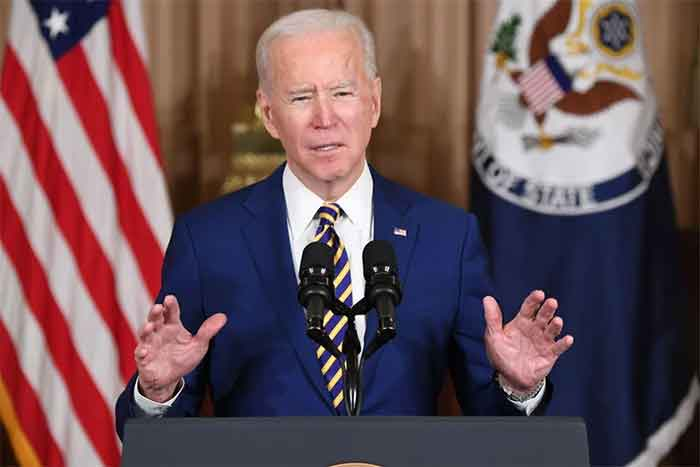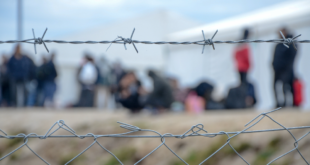The U.S. President Joe Biden has declared that America is back. He was addressing a session of the Munich Security Conference from the White House Friday.
Biden said: And I’m a man of my word — America is back. I speak to you today as president of the United States at the very start of my administration, and I’m sending a clear message to the world: America is back, the trans-Atlantic alliance is back, and we are not looking backward. We are looking forward together. The global dynamics have shifted. New crises demand our attention. We cannot focus only on the competition among countries that threaten to divide the world or only on global challenges that threaten to sink us all together if we fail to cooperate. We must do both, working in lockstep with our allies and partners. So let me erase any lingering doubt. The United States will work closely with our European Union partners and the capitals across the continent.
He used his first public encounter with U.S.’s European allies to describe a new struggle.
His stressed reinvigorating alliances.
But there was pushback, notably from the French president Emmanuel Macron, who in his address made an impassioned defense of his concept of “strategic autonomy” from the U.S.
The French President made the case that Europe can no longer be overly dependent on the U.S. as it focuses more of its attention on Asia, especially China.
German Chancellor Angela Merkel’s message was “Our interests will not always converge.”
The German Chancellor appeared to be a reference to Germany’s ambivalence about confronting China — a major market for its automobiles and other high-end German products — and to the continuing battle with the U.S. over the construction of the Nord Stream 2 gas pipeline to Russia.
It was the three leaders’ first virtual encounter.
The U.S. President Biden used the moment to warn about the need for a common strategy in pushing back at an Internet-fueled narrative, promoted by both Presidents Vladimir Putin of Russia and Xi Jinping of China, that the chaos surrounding the U.S. election was another sign of democratic weakness and decline.
Biden tried to recall the first principles that led to the Atlantic alliance and the creation of NATO in 1949, near the beginning of the Cold War.
Biden cast the U.S. as ready to assume its responsibilities as the linchpin of the alliance. “We will keep the faith” with the obligation, he said, adding, “an attack on one is an attack on all.”
Biden also pressed Europe to think about challenges in a new way — different from the Cold War, even if the two biggest geostrategic adversaries seem familiar. “We must prepare together for long-term strategic competition with China,” he said, naming “cyberspace, artificial intelligence and biotechnology” as the new territory for competition.
He argued for pushing back against Russia. He called Putin by his last name, with no title attached.
The President avoided delving in to the difficult question of how to make Russia pay a price without escalating the confrontation.
A senior White House cyberofficial told reporters this week that the scope and depth of the Russian intrusion was still under study, and officials are clearly struggling to come up with options to fulfill Biden’s commitment to make Putin pay a price for the attack.
Macron has made a habit of criticizing the NATO alliance as nearing “brain death” and no longer “pertinent” since the disappearance of the Warsaw Pact, that captured attention. Macron wants NATO to act as more of a political body, a place where European members have equivalent status to the U.S. and are less subject to the U.S. tendency to dominate decision-making.
A Europe better able to defend itself, and more autonomous, would make NATO “even stronger than before,” Macron insisted. He said Europe should be “much more in charge of its own security,” increasing its commitments to spending on defense to “rebalance” the trans-Atlantic relationship.
Dialogue with Russia
Macron also urged that the renovation of NATO’s security abilities should involve “a dialogue with Russia.” Macron spoke about the importance of dialogue with Moscow, saying that Russia is a part of Europe that cannot simply be shunned.
Given Biden’s firm tone on confronting President Vladimir V. Putin and restoring the territorial integrity of Ukraine, this apparently softer French line on relations with Russia suggested possible future tensions.
Macron, speaking in English to answer a question, also argued that Europe could not count on the U.S. as much as it had in past decades. “We must take more of the burden of our own protection,” he said.
New realities
Macron made it clear that the postwar U.S.-dominated world order needs to yield to new realities.
Macron is determined to increase the EU’s technological capacities so that it can become less dependent on U.S. and Chinese supply chains.
A sovereign Europe
Macron, who faces a presidential election next year, has made the need for “a sovereign Europe” a core theme.
While France, like other European allies, has been delighted to see the end of the Trump era and has welcomed Biden, it has concluded that complete trust in the reliability of the U.S. is no longer a viable strategic option.
Biden, in contrast, wants to deepen those supply chains — of both hardware and software — among like-minded Western allies in an effort to lessen Chinese influence. He is preparing to propose a new joint project for European and U.S. technology companies in areas like semiconductors and the kinds of software.
China, a necessary partner
Merkel dwelled on dealing with China, which she said was “perhaps more complicated,” given its dual role as competitor and necessary partner for the West. “In recent years, China has gained global clout, and as trans-Atlantic partners and democracies, we must do something to counter this,” Merkel said.
“Russia continually entangles European Union members in hybrid conflicts,” she said. “Consequently, it is important that we come up with a trans-Atlantic agenda toward Russia that makes cooperative offers on the one hand, but on the other very clearly names the differences.”
No longer willing to simply follow the U.S.
Merkel made it clear that even though she welcomed President Biden’s overtures, Germany is no longer willing to simply follow the U.S. on the world stage.
The German chancellor stressed that words alone will not be sufficient. “It’s only actually good if you follow through,” Merkel said.
Calls to better regulate internet giants
The EU has largely set the regulatory framework for the chaos of the internet.
On Friday, Ursula von der Leyen, president of the European Commission, called for the U.S. to join Europe “in creating a digital economy rule book valid worldwide, a set of rules based on our values.”
Ms. von der Leyen, speaking at the Munich Security Conference, cited the storming of the United States Capitol on Jan. 6 as “a turning point for our discussion of the impact social media has on our democracies.”
It was only a “short step from crude conspiracy theories to the death of police officers,” she said.
Regulating the power of big tech companies would be “an important step” in stopping political violence, she insisted, adding: “We want clear requirements that internet firms take responsibility for the content they distribute, promote and remove.”
Decisions must not be left to “the boardrooms of Silicon Valley
Decisions on content must not be left to computer programs or to “the boardrooms of Silicon Valley,” she said. They must be made by democratically elected legislators, an argument France has consistently made.
Investment agreement with China
On Dec. 30, just weeks before the inauguration, the EU clinched an important investment agreement with China, only days after a tweet by Biden’s national security adviser, Jake Sullivan, asking for “early consultations” with Europe on China and seeming to caution against a quick deal.
Europe’s own course
Even as the U.S. resets under new White House leadership, Europe is charting its own course on Russia and China in ways that do not necessarily align with Biden’s goals, posing a challenge as the new U.S. president sets out to rebuild a post-Trump alliance with the continent.
Biden promised that the U.S. would again “shoulder our responsibility of leadership.”
But if by “leadership” Biden means a return to the traditional U.S. assumption — we decide and you follow — many Europeans feel that world is gone, and that Europe must not behave like America’s junior wingman in fights defined by Washington.
Demonstrated by the EU’s trade deal with China, and conciliatory talk about Moscow from leaders like Macron and Germany’s likely next chancellor, Armin Laschet, Europe has its own set of interests and ideas about how to manage the U.S.’s two main rivals, ones that will complicate Biden’s diplomacy.
“Biden is signaling an incredibly hawkish approach to Russia, lumping it in with China, and defining a new global Cold War against authoritarianism,” said Jeremy Shapiro, the research director at the European Council on Foreign Relations.
That makes many European leaders nervous, he said. And other regional experts said they had seen fewer signs of overt enthusiasm from the continent than Biden administration officials might have hoped for.
Hey guys, we’re back
“There was always a clear eyed recognition that we weren’t just going to be able to show up and say, ‘Hey guys, we’re back!’” said Andrea Kendall-Taylor, who was in line to become the National Security Council director for Russia but who did not take the job for personal reasons.
 Eurasia Press & News
Eurasia Press & News




